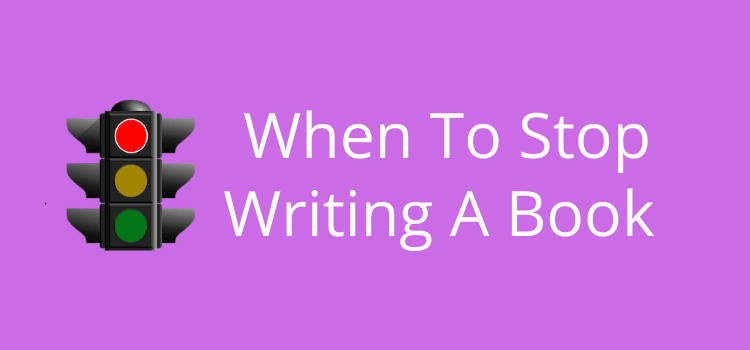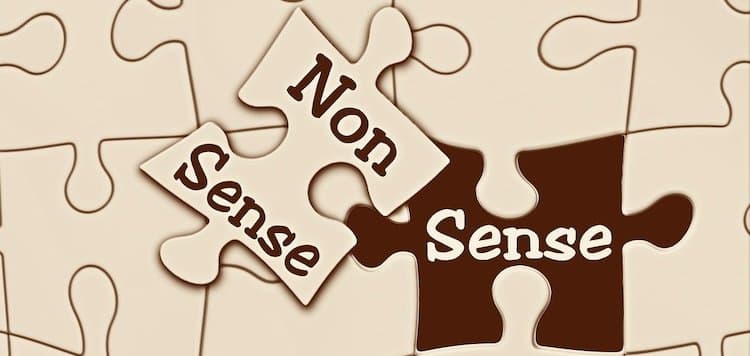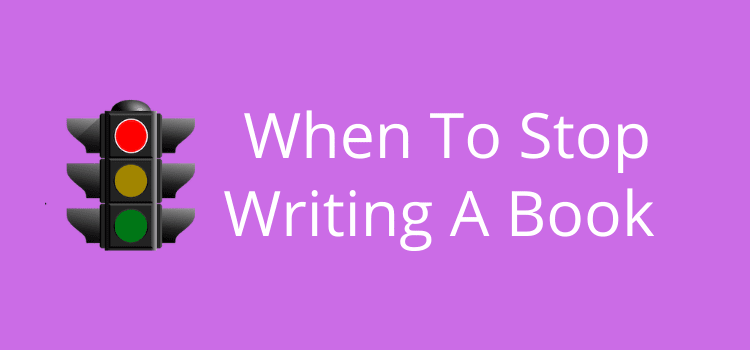Stop Writing A Book When These Ten Things Happen

It’s a tough decision for any author to stop writing a book.
You started your writing project with a lot of enthusiasm. But now it’s becoming a grind.
Every writer has a file of unfinished, abandoned, or forgotten manuscripts. So don’t think that you are alone when you start having doubts about your book.
As in any walk of life, you don’t always succeed. You win a few, and you lose a few.
Ten reasons to stop writing a book
It’s the last thing you want to do.
But knowing when to quit writing a book is a decision all authors make from time to time.
There can be lots of reasons. However, here are ten that might help you clarify your thinking about your book project.
If you suffer from only one or two, keep trying.
But if more than a few of these reasons apply to you, it might be time to stop and reevaluate.
1. Writing your book is hard and not a pleasure
Your first 10,000 words might have come easy. But then, for some reason, the words become harder and harder to find.
What started as an absolute pleasure is now becoming a chore.
If you reach the stage where you don’t look forward to your writing sessions, it’s time to rethink.
When you enjoy writing a book, the words will flow easily. But when you have to force yourself, the words become tough to find.
2. You’re not thinking about your book 24/7
When you’re on a winner, new ideas come thick and fast. So many that you can’t write fast enough.
But when you get to the stage that you’re not thinking about your book all day, every day, something is going wrong.
It’s a big problem when you have to push yourself for new ideas or feel like you have writer’s block.
Yes, you can take a break from your book, and it can help. But if it doesn’t, perhaps you need to reconsider your options.
3. You don’t get excited anymore

You were excited about your story, but now you are becoming bored with it.
If you can’t find excitement in writing your story, it’s a good sign that it might be time to stop writing your book.
When there is no enjoyment or excitement for you, there will undoubtedly be little for a reader as well.
4. You don’t love your characters

If you don’t have your characters living in your head, it is very hard to write.
You probably have character profiles for each one, but are they realistic? You have to know them, love them, feel for them, and work with them.
If you don’t, there’s a danger that they will be weak and fail to drive your story.
5. You’ve run out of ideas
You probably had plenty of notes, a plan, or even a detailed snowflake outline when you began your story.
But now, you feel that you can’t find ways to fill in the detail and develop your plot.
You can try changing your plan, but you will have a lot of rewriting to do.
You always need new ideas to keep you writing. But when they stop coming, there’s nothing more to write.
6. You are only writing towards your word count
You planned for your novel or nonfiction book to be 80-90,000 words.
You’re looking at your word count now, and it’s only 45,000. Yet, the story might be more or less finished.
If your only motivation is to write another 45,000 words, it’s unlikely to make for good reading.
7. The plot doesn’t make sense

You might need the help of an editor or beta reader to guide you with this.
It’s sometimes difficult for you to decide when you are writing. But try to stand back and read your draft to see if things make sense.
Yes, it might be fiction, but your plot still needs to be logical and realistic.
8. You edit more than you write
When your writing sessions become hours of editing, correcting, and rewriting, you are not making any progress.
No amount of fiddling will help you finish your first draft.
It’s a good sign that you have run out of ideas and that your story is leading nowhere.
9. You don’t want to waste 25,000 words
It took you three months to write the first few chapters, and you don’t want to let all that effort go to waste.
Yes, it’s tough to ditch all those words.
But if there is no end in sight, and you have been procrastinating for ages, it’s a sign that it might be time to stop writing a book.
10. You’re not a quitter
If you think that your manuscript is leading nowhere or is becoming laborious to write, deciding to stop is not being a quitter.
It’s much better to devote your energy and writing talent to a new, more exciting project.
Deciding to quit writing a book is a decision all authors occasionally make, and it is not a failing.
It’s a sign of being decisive and developing your writing knowledge and skills.
Conclusion
Making the decision to stop writing a book is not a defeat.
My hard drive is full of half-written books, new story notes, and other abandoned writing projects.
But they can be useful at some later stage when your head is clear. I’ve resurrected a few over the years, so there is hope for certain projects.
The essential element in deciding whether to continue or stop is how much time you are wasting.
In my experience, my better books were easy to write, and I was always anxious to get to my keyboard and couldn’t write fast enough.
One book I wrote required an enormous amount of research, so it took much longer to write. But I enjoyed all the time I spent researching and discovering.
Writing is a wonderful craft, and it should be an enjoyable experience.
But if you lose the enjoyment for one story or project, it’s not the end of the world.
It just means that it might be a sign that you need to move on to something new and more exciting.
The post Stop Writing A Book When These Ten Things Happen appeared first on Just Publishing Advice For Writers and Authors.

